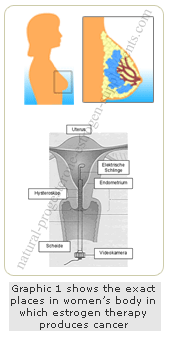34 MENOPAUSE SYMPTOMS |
HEALTH CENTER |
|
LEARN MORE |
|||||||||||||||||||||||||||||||||||||||||||||||
| Menopause | |||||||||||||||||||||||||||||||||||||||||||||||
| Symptoms | |||||||||||||||||||||||||||||||||||||||||||||||
| Herbs for Menopause | |||||||||||||||||||||||||||||||||||||||||||||||
|
|||||||||||||||||||||||||||||||||||||||||||||||
|
|||||||||||||||||||||||||||||||||||||||||||||||
|
|
Estrogen-Progestin Hormone Replacement Therapy Associated With Increase in Breast Cancer Risk |
| A recent study from the National Cancer Institute (NCI) in Maryland suggests that women in hormone replacement therapies (HRT) which combine estrogen and progestin are at greater risk of developing breast cancer than women who take estrogen alone. |
|
Estrogen replacement therapy became available in the 1940s, and was administered then in high doses without progestin. In the 1970s, however, medical specialist noted that women who received estrogen alone had a six to eight times higher risk of developing cancer of the endometrium (the lining of the uterus) than non-users. That is the reason why in the early 1980s progestin hormone was added to the estrogen replacement therapy regimen to counter the high risk of cancer of the endometrium. Nonetheless, researchers suspected that the estrogen-progestin regimen may be associated with greater increases in breast cancer risk than estrogen alone. Doctor Catherine Schairer, PhD, of the NCI's Division of Cancer Epidemiology and Genetics and colleagues analyzed follow-up information from a subset of 46,355 participants in the Breast Cancer Detection Demonstration Project (BCDDP), a nationwide breast cancer screening program. The researchers analyzed the data from follow-up questionnaires and interviews and compared the new cases of breast cancer with the type of hormone replacement therapy used for this group of women who had no previous evidence nor diagnosis of breast cancer. |
 |
There were 2082 cases of breast cancer identified during the 1980 through 1 995 follow-up period. After adjusting for age, education, body mass index, history of mammography and age at menopause, compared with women who had not taken HRT, the authors published their study at the Journal of American Medical Association, showing the following results:
"These results, as well as those from other studies, suggest that women who take hormones for two to three years for relief of menopausal symptoms are at increased risk of breast cancer," said Catherine Schairer, Ph.D. But the difference between the two types of hormone therapy was only statistically significant in leaner women, not those who were overweight or obese. In her comments to Reuters Health, Schairer said that there were not enough heavier women in the study who had taken combination therapy to get accurate results. More studies evaluating longer-term use of estrogen in combination with progestin and different combination regimens of hormones are needed in the future. However, decisions for women and their physicians should be made based on the individual considerations. Regardless of hormone use, Schairer said, "It's very important for all women to get periodic (breast cancer) screening. Women on hormone replacement therapy should be particularly careful." By Natural-Progesterone-Estrogen-Supplements.com
Sources: "Menopausal Estrogen and Estrogen-Progestin Replacement Therapy and Breast Cancer Risk" by Catherine Schairer, Jay Lubin, Rebecca Troisi, et al. Published in the Journal of American Medicine Association in Jan. 26, 2000, Vol. 283, No.4. |
| Back to Home: | 34 Menopause Symptoms |  |
| Copyright� 2008 - Hormone Replacement Therapy - All Rights Reserved |
